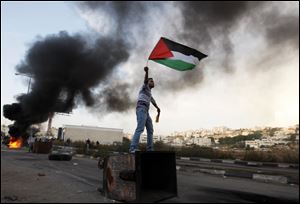
Israeli bomb hits house in Gaza, kills 11 civilians
5th day of cross-border fire from Hamas paralyzes cities
11/19/2012
A Palestinian waves the national flag during a protest against Israel’s airstrikes in Gaza.
GAZA CITY — An Israeli bomb pummeled a home Sunday, killing 11 people, including nine in three generations of a single family, in the deadliest strike since the cross-border conflict between Israel and the militant faction Hamas escalated last week.
The airstrike, along with several others that killed civilians across the Gaza coastal territory and hit two media offices — one of them used by Western TV networks — further indicated that Israel was striking a wider range of targets.
Gaza health officials reported the number of people injured had nearly doubled to 600 by day’s end; the Palestinian death toll climbed to 70, including 20 children.
Three Israelis have been killed and at least 79 have been wounded by rocket fire into southern Israel and as far north as Tel Aviv.
Israeli cities were paralyzed by relentless rocket fire from Gaza for a fifth day.
Speaking from Asia on Sunday, President Obama condemned missile attacks by Palestinians in Gaza and said Israel had a right to protect itself.
“There’s no country on Earth that would tolerate missiles raining down on its citizens from outside its borders,” Mr. Obama said in his first public comments since the violence broke out. “We are fully supportive of Israel’s right to defend itself.”
The President also said efforts were under way to address Israel’s security concerns and end the violence.
“We’re going to have to see what kind of progress we can make in the next 24, 36, 48 hours,” Mr. Obama said.
Israeli tanks and troops remained lined up outside Gaza. Tens of thousands of reserve troops had been called up.
“The army is prepared to significantly expand the operation,” Israeli Prime Minister Benjamin Netanyahu said at the start of a Cabinet meeting.
As cease-fire talks began in Cairo, both sides were digging in, officials said.
Hamas made sweeping demands, including the permanent opening of the border crossing between Gaza and Egypt and the end of the Israeli blockade.
Mr. Netanyahu, meanwhile, has stuck to his demand that all rocket fire cease before the Israeli campaign lets up.
In the Israeli strike on Sunday morning, it took emergency workers and heavy machinery more than an hour to reveal the extent of the devastation under the two-story home of Jamal Dalu, a shop owner. Mr. Dalu was at a neighbor’s home when the blast wiped out nearly his entire family: His sister, wife, two daughters, daughter-in-law, and four grandchildren ages 2 to 6 all perished under the rubble, along with two neighbors.
Ismail Haniyeh, prime minister of the militant Hamas faction that rules Gaza, condemned the attack as a “massacre” that “exceeded all expectations.”
Brig. Gen. Yoav Mordechai, the Israeli military’s chief spokesman, said it was “examining the event.” “The wanted target in this case was responsible for firing dozens of rockets into Israel,” he said. “I do not know what happened to him, but I do know that we are committed to the safety of the citizens of Israel.”
Momentarily lulled by a quiet night, Israelis awoke to a blitz of Palestinian rockets that totaled nearly 100 by nightfall, including two that soared toward Tel Aviv but were knocked out of the sky by the Iron Dome missile defense system.
One rocket crashed through the roof of an apartment building in Ashkelon, a few miles up the coast from Gaza, where residents escaped serious injury because they heeded the warning siren and ran to lower floors.
A barrage of 10 missiles rained on Ashdod; nine were intercepted and the 10th hit an eight-story building but did not explode, heightening fears as residents were told to remain inside.
Routine activity in the region ground to a halt as people huddled in bomb shelters, where many spent the night. Malls were closed; few walked in the street.
The Gaza Strip has no warning sirens. Sunday’s wee hours were punctuated by airstrikes as well as a series of missiles fired from Israeli Navy vessels off the coast.
Among the buildings Israel hit overnight were two containing the offices of local media outlets, in what the military called an attempt to derail Hamas communications. The Israeli Air Force also briefly took control of Hamas’ radio network, broadcasting a message to Gaza residents.
“Hamas is playing with fire and risking you,” it warned. “We recommend that you stay away from the places of terrorists and the infrastructure of Hamas.”
Ayman Amar, a spokesman for Al Quds television, said seven camera operators and editors were resting on couches in their 11th-floor offices in the Shawa and Hossari building in Gaza City when a missile from an Israeli helicopter ripped through the roof.
All seven were injured, Mr. Amar said, but they escaped before three more bombs dropped 10 minutes later. “This will not deter us from showing the truth to the world,” he declared, as colleagues cleared the rubble. “We will not stop. It is our duty toward our cause to support the Palestinian people.”
Salama Marouf of the Hamas media office called the attack “an immoral massacre against the media,” and the Foreign Press Association’s Jerusalem chapter lodged a protest.
Several international outlets, including Fox News, Sky News, CBS, and Germany’s ARD television, used studios in the two targeted media buildings.
Israel’s vice prime minister, Moshe Ya’alon, said the strike “didn’t intend to target journalists.” He said he had asked the military to investigate.